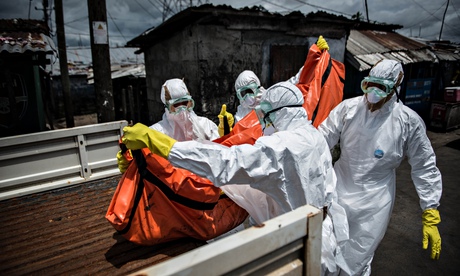
The Ebola epidemic, which is out of control in three countries and directly threatening 15 others, may not end until the world has a vaccine against the disease, according to one of the scientists who discovered the virus.
Professor Peter Piot, director of the London School of Hygiene and Tropical Medicine, said it would not have been difficult to contain the outbreak if those on the ground and the UN had acted promptly earlier this year. “Something that is easy to control got completely out of hand,” said Piot, who was part of a team that identified the causes of the first outbreak of Ebola in Zaire, now the Democratic Republic of Congo, in 1976 and helped bring it to an end.
The scale of the epidemic in Sierra Leone, Liberia and Guinea means that isolation, care and tracing and monitoring contacts, which have worked before, will not halt the spread. “It may be that we have to wait for a vaccine to stop the epidemic,” he said.
On Thursday night, a Downing Street spokesman said a meeting of the government’s emergency response committee, Cobra, was told the chief medical officer still believed the risk to the UK remained low.
“There was a discussion over the need for the international community to do much more to support the fight against the disease in the region,” the spokesman said. “This included greater coordination of the international effort, an increase in the amount of spending and more support for international workers who were, or who were considering, working in the region. The prime minister set out that he wanted to make progress on these issues at the European council next week.”
Dr Tom Frieden, director of the Centers for Disease Control (CDC), in evidence to Congress, said he was confident the outbreak would be checked in the US, but stressed the need to halt the raging west African epidemic.
“There are no shortcuts in the control of Ebola and it is not easy to control it. To protect the United States we need to stop it at its source,” he said.
“One of the things I fear about Ebola is that it could spread more widely in Africa. If this were to happen it could become a threat to our health system and the healthcare we give for a long time to come.”
There are three vaccines now being fast-tracked through early safety trials in volunteers in the UK, the US and in unaffected Mali to ensure that they do no harm. The results should be available by the end of November or start of December. If they are acceptable, it is likely that healthcare workers – who are at highest risk of being infected and over 200 of whom have died – will be offered a vaccination before Christmas. But the only proof that any of them works will be if there is a significant drop in the number of deaths among vaccinated people on the front line.
“If the epidemic is not going to be stopped in these three countries, it will definitely spread to adjacent countries such as Ivory Coast, Guinea Bissau and Mali,” said Piot.
He was speaking at a seminar in Oxford as the World Health Organisation (WHO) warned that 15 countries, neighbouring or trading with those where the epidemic is raging, were at risk. They are Ivory Coast, Guinea Bissau, Mali, Senegal, Benin, Burkina Faso, Cameroon, Central African Republic, the Democratic Republic of Congo, Gambia, Ghana, Mauritania, Nigeria, South Sudan and Togo. Nigeria and Senegal have both succeeded in halting an outbreak. Nonetheless, Dr Isabelle Nuttall of the WHO said all needed to be better prepared. “The objective is to stop the transmission from occurring in these countries. They may have a case but after one case we don’t want more cases,” she said at a briefing.
By the end of the week, she predicted, the number of cases will have risen to over 9,000, with more than 4,500 deaths.
“It could lead to major destabilisation of societies and also political destabilisation,” said Piot. “It is going to come at a very high cost. Some countries are very vulnerable. The economic impact is already enormous – just as Sars a decade ago only killed 700, but the economic impact was tens of billions of dollars.
“My concern is that, as so often after a war or crisis, we say never again and then we forget about it.”
Piot said he thought the prospects for an effective vaccine were good. The three candidates had shown good results in animal trials. Piot is chairing a WHO scientific committee on Ebola, looking at who to vaccinate and how and at what dose. He said he was optimistic, but the manufacturers would have to boost their production capacity and massive vaccination campaigns would have to be organised.
In written testimony to the House of Representatives, however, Anthony Fauci, Director of the National Institute of Allergy and Infectious Diseases (NIAID), was cautious about the progress being made on drugs and vaccines. “While NIAID is an active participant in the global effort to address the public health emergency occurring in west Africa, it is important to recognise that we are still in the early stages of understanding how infection with the Ebola virus can be treated and prevented,” he said.
The United Nations Population Fund (UNFPA) warned that around 120,000 women could die in childbirth within the next year in Sierra Leone, Liberia and Guinea because of the breakdown of healthcare and fears of contracting Ebola in hospital. It estimates that 800,000 women will give birth in the next 12 months, of whom 120,000 may suffer complications and need lifesaving emergency care.
“The reality is that pregnant women are facing a double threat – dying from Ebola and from pregnancy or childbirth, due to the devastating impact of Ebola on health workers and health systems,” said UNFPA executive director, Dr Babatunde Osotimehin.
